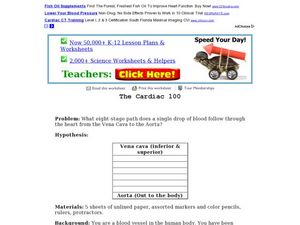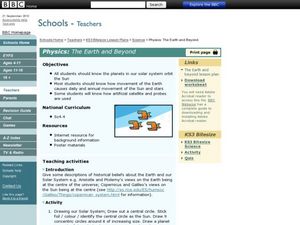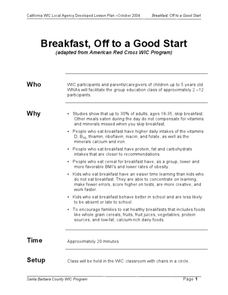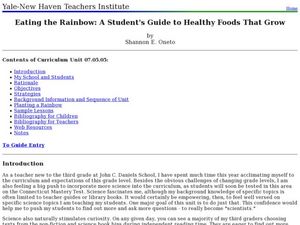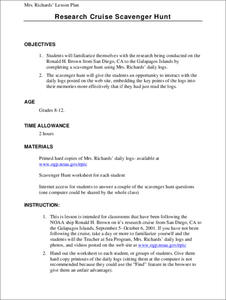Curated OER
The Cardiac 100
Students make a full scale diagram. In this heart and blood flow lesson plan, students pretend they must design the cardiac 100 racecourse and they must teach the new blood cells how to get around the heart. Students create a mini...
Curated OER
Where in the world is...
Pupils identify locations around the world. For this mapping lesson, students place tag board pieces with names of locations on a wall map of the world. Initially, pupils identify states, then cities, then continents, eventually adding...
Curated OER
Physics The Earth and Beyond
Fourth graders will explore our solar system. In this physics instructional activity students create a model of the solar system to explore the movement of Earth, the Sun, and stars.
Curated OER
Kites: Patang - The Indian Fighter Kite
Students investigate the history of fighter kites and build their own. In this aeronautics lesson, students discover how other countries utilize fighter kites and where they originated. Students create their own fighter kites in class...
Curated OER
Advertising – Does it Affect Our Purchasing Descisions?
Students consider the power of advertisements. In this consumerism lesson, students dicuss advertising techniques, advertising regulations, and analyze advertisements. Students also complete and evaluate and ad count actvitiy.
Curated OER
Four Seasons
Students investigate the four seasons in a year. In this seasons lesson, students explore the weather during each season. Students illustrate each season with pictures.
Curated OER
Breakfast, Off to a Good Start
Students discover the benefits of eating a healthy breakfast. In this adult health lesson plan, students compare the characteristics of breakfast eaters and nonbreakfast eaters. They examine cereals for their fiber and sugar content.
Curated OER
Breakfast Boosts Brainpower
Students examine the importance of eating a balanced breakfast. In this healthy eating lesson students identify examples of a healthy breakfast and compare the characteristics of people who do or do not eat breakfast.
Curated OER
Transportation Systems
Learners examine transportation systems and explore problems created by modern transportation. In this transportation systems instructional activity, students discuss various forms of transportation as it relates to depletion of our...
Curated OER
Kumara Math
Students explore nutrition by completing math problems in class. In this food conversions lesson, students identify what the kumara plant is and how it can contribute to human health by regularly consuming an appropriate amount. Students...
Curated OER
the Holocaust: the Life of a Jew
Students describe in detail the harsh conditions that the Jews were faced with. They practice their writing skills by keeping a daily journal and identify how their lives have been influenced by the Holocaust.
Curated OER
Routines and habits
Students tell time to the hour, half hour and quarter hour. They practice vocabulary of daily routines. They match word cards with a picture representation of the card. They graph classmates schedules.
Curated OER
VH1 AIDS: A Pop Culture History Lesson 1
Learners observe and discuss the relationships between music, media, and popular culture.
Curated OER
Lesson: Peaches
Learners explore the benefits of eating fruits and vegetables. They discover how to choose and store peaches and use recipes to prepare peaches. They explore the history of peaches and discuss the benefits of eating peaches.
Curated OER
Eating the Rainbow: A Student's Guide to Healthy Foods That Grow
Third graders examine the nutritional value of different foods. In this health science lesson, 3rd graders create a daily log of the foods they eat and categorize them. They plan a healthy menu for their family.
Curated OER
Gotcha Covered, Pardner!
Young geometers use the interactive website Cyberchase to practice calculating both area and perimeter. Real world problems encourage learners to discover that we use math each and every day.
Curated OER
"No News Like Ancient News"
Want to know more about Ancient history? Young historians will read a minimum of two web sites to complete the chart "Residents of Olympus". They choose one Greek god or goddess to research. This could be a small group activity or...
Curated OER
Research Cruise Scavenger Hunt
Students track the research cruise of the Ronald H. Brown from San Diego to the Galapagos Islands. They match research groups with the key words, using the ship's daily logs to find the answers.
Curated OER
Rain Forest Rally
Young scholars discover facts about rain forests, list the common products that come from rain forests, recognize how important rain forests are to our daily lives, and list and describe the layers of rain forests.
Curated OER
Looking at the Old South: Music and Culture
Learners use different styles of music to research society, history and culture in the American South. They, in groups, research an assigned piece of music and make a presentation to the class. They keep a daily journal as well.
Curated OER
Menu Madness
Students determine the nutritional values of fast foods. Then they make comparisons of their results and present their findings to the class. They compare the nutritional values of fast foods based on information provided on menus.
Curated OER
Help! I Need Five Minutes to Study
Students learn to use a time grid or a calendar to increase productivity of their studying. In this studying lesson, students record how they spend their studying time and then adjust as needed. Students recognize various ways to...
Curated OER
Creating Fitness Goals
Students create a fitness goal to include one of the following: muscle building, cardiovascular development or healthful diet. They utilize a daily calendar to record progress. They utilize the Internet to research proper ways to reach...
Curated OER
How Much of Each Nutrient Does Your Body Need, and How Can You Find Out What Is In Each Food?
Fifth graders practice reading food labels to find nutrients in foods. In this health lesson, 5th graders read food labels and discuss the recommended daily allowance of each nutrient. They compare this to the food pyramid and create a...


